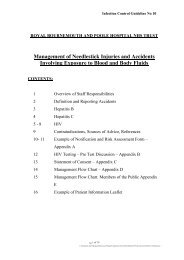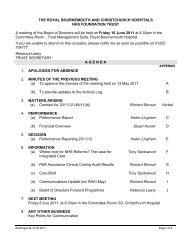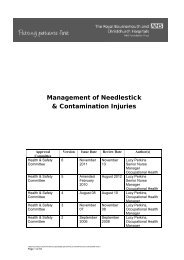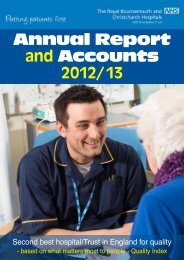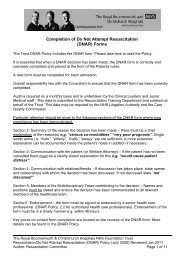A G E N D A 1. APOLOGIES FOR ABSENCE Ian Metcalfe 2 ...
A G E N D A 1. APOLOGIES FOR ABSENCE Ian Metcalfe 2 ...
A G E N D A 1. APOLOGIES FOR ABSENCE Ian Metcalfe 2 ...
You also want an ePaper? Increase the reach of your titles
YUMPU automatically turns print PDFs into web optimized ePapers that Google loves.
Board of Directors Part I14 th June 2013<strong>1.</strong> IntroductionCommissioner Requested Servicesand Location Specific ServicesIn the past as part of the previous licensing regime for Foundation Trusts (FTs) andbecause of the quasi-independence that this provides, for each FT certain services weredesignated as “mandatory”. The intention of this was that the Trust could not arbitrarilyclose down services, for example on the basis of an adverse financial position for a givenservice. The new Monitor licensing regime has meant a review of this position and thepublication of guidance for FTs http://www.monitor-nhsft.gov.uk/home/news-eventspublications/our-publications/browse-category/guidance-health-care-providers-and-co-19The guidance uses the term Commissioner Requested Services (CRS) for previouslymandatory services. It also introduces a new term - Location Specific Services (LCS) forservices that “should be maintained by the trust Special Administrator at or close to theprovider”. This latter category is therefore intended to be for services that need to beprovided even if a provider fails financially.2. Key Issues• Services described as mandatory have been transferred entirely to the newcategory of CRS• The CRS designation will apply until April 2016• Commissioners are expected to review the designation of CRS services over thenext three years• There is a 4 stage Designation Framework developed to support the commissionerprocess3. The Designation Framework1) Information gathering – to define the service being assessed and identify keyfeatures of the service;2) Considering suitable alternative provision – to assess the availability, capacity andaccessibility of alternative providers and/or pathways;3) Considering any impact on health inequalities – to assess whether disadvantagedgroups may be significantly adversely affected if the service is withdrawn, includingwhether they might face particular difficulties in accessing alternative providers; and4) Considering interdependent services – to determine whether the safe and effectiveoperation of the service requires co-dependent services to be retained as well, orwhether there are feasible alternative providers for any co-dependent services.Commissioner Requested Services and Location Specific Services Page 1 of 3For Information



